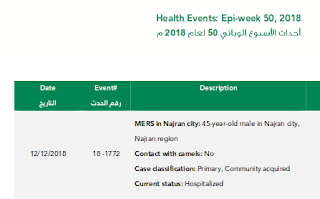#13,730
WHO's EMRO (Eastern Mediterranean Regional Office) has released their latest monthly summary of global MERS cases, showing 8 cases in November, all from Saudi Arabia. Two of the cases are described as secondary household contacts.
Much of the recent, and dramatic, drop in MERS cases in Saudi Arabia has been attributed to improved infection control in hospitals, which has resulted in fewer, and much smaller, nosocomial outbreaks.The reporting of community acquired cases continues, with camel exposure accounting for only a portion of these infections. All of which raise questions about how, and how well, the virus might be spreading via asymptomatic or mildly infected individuals.
A few on-point studies over the past few months include:
mBio: High Prevalence of MERS-CoV Infection in Camel Workers in Saudi Arabia
AJIC:Intermittent Positive Testing For MERS-CoV
JIDC: Atypical Presentation Of MERS-CoV In A Lebanese PatientAnd in August - in Evaluation of a Visual Triage for the Screening of MERS-CoV Patients - we looked at what has been described as a serious flaw in Saudi Arabia's MERS surveillance program.
The latest EMRO MERS summary reads:
Read the latest MERS update, November 2018
- At the end of November 2018, a total of 2274 laboratory-confirmed cases of Middle East respiratory syndrome (MERS), including 806 associated deaths (case–fatality rate: 35.4%) were reported globally; the majority of these cases were reported from Saudi Arabia (1896 cases, including 732 related deaths with a case–fatality rate of 38.6%).
- During the month of November, a total of 8 laboratory-confirmed cases of MERS were reported globally (all from Saudi Arabia), including 2 associated death. Two of the cases were a secondary infection through household contact. The demographic and epidemiological characteristics of reported cases, when compared during the same corresponding period of 2013 to 2018, do not show any significant di erence or change. Owing to improved infection prevention and control practices in hospitals, the number of hospital-acquired cases of MERS has dropped significantly since 2015.
- The age group 50–59 years continues to be at highest risk for acquiring infection of primary cases. The age group 30–39 years is most at risk for secondary cases. The number of deaths is higher in the age group 50–59 years for primary cases and 70–79 years for secondary cases.
And lastly, after going two weeks (epi weeks 48 & 49) without reporting any new cases, today the Saudi MOH has announced a new case in Najran (45, M), without known camel contact.

